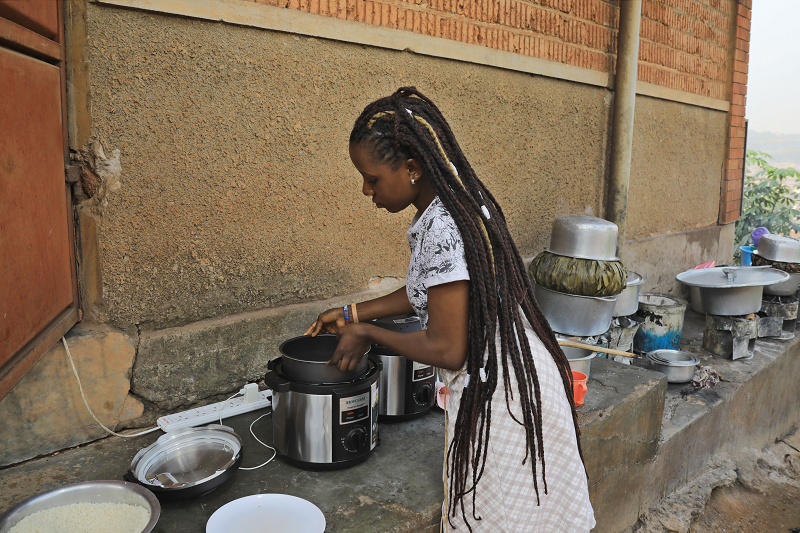
- Date
- 4th December 2023
- Categories
- Carbon Market Regulations, Clean Cooking, COP28, NDCs
By Dr Samir Thapa (MECS Programme, Loughborough University)
This is the second of three blogs that talk about the convergence of COP28 aspirations, the Carbon Market Regulations, and the Nationally Determined Contributions (NDCs) on cooking. This blog provides a snapshot of the carbon market regulations in relation to clean cooking promotion for some of the clean cooking early mover countries – Nepal, Kenya, Tanzania, Ghana, and Uganda. All the countries mentioned have expressed their willingness to engage with the Paris Agreement Article 6 cooperative approaches in their NDCs. Nepal was one of the early movers, with the preparation of its Environment Protection Act, 2019 (Cl. 28) and subsequent Environment Protection Regulation, 2020. The regulation however only details the procedures for projects under the UN Clean Development Mechanism and does not spell out requirements for Article 6 and voluntary standards1.
Tanzania was the first African Nation to prepare its regulation for carbon trading in October 2022, based on its Principal legislation – the Environmental Management Act, 2004. Kenya recently approved its amendment bill to its Climate Change Act, 2016 in September 2023 to include the provisions to engage with the carbon market and non-market mechanisms and is now preparing a draft carbon market regulation. These regulations provide clarity on the schedule for project endorsement, approval, and implementation together with the fees and share of proceeds. Ghana’s Ministry of Environment, Science, Technology, and Innovation published a Framework on International Carbon Markets and Non-market Approaches in December 2022 based on its Environment Protection Agency Act, 1994. The document is comprehensive with detailed sections, instructions, schedules, and template documents for Article 6.2, 6.4 and Voluntary Carbon Market projects, including requirements for corresponding adjustments and linkages to its national registry. Uganda’s National Climate Change Act, 2021 (Part III) establishes in principle their mandate to engage with carbon trade. It is preparing its regulation and is expected to be a highly standard document with lessons learnt from previous regulations.
It is expected that more countries seeking cooperative approaches and related clean cooking objectives in their NDCs will amend and formulate related legislation. This will allow the market and the adjacent government institutions (e.g., the Ministry of Energy) to engage and collaborate to generate the much-needed finance for clean cooking. Particularly, such country-level legislation will allow opportunities to clarify issues such as the corresponding adjustments, use of the national registry and expected roles and responsibilities, important for the Voluntary Carbon Market entities. This will create country-level ownership towards a holistic carbon market, including for the VCM (e.g., Ghana Framework), which was lacking during the Kyoto Protocol when Non-Annex I party commitments were not mandatory. Ghana’s framework introduces a Whitelist of activities2 that include clean cooking. Such Whitelists reduce project risks allowing developers to implement projects without having to prove their additionality, while simultaneously seeking authorisations (e.g., for validation) both at the country level and with international standards such as the Gold Standard.
Some regulations have also addressed benefit sharing and distribution of carbon revenues (e.g., Kenya, Tanzania). However, these are particular to land-based projects with benefits linked to management contributions across institutions and communities in the value chain, understood to be a legacy practice with the forest-based payment for eco-system services overlapped with the fact that related legislations are prepared by forestry and/or environment ministries. It is important to consider benefit sharing for non-land-based projects such as clean cooking where emission reductions are contingent on the continuous use by the consumers rather than a community. In this, mechanism/s to link all or part of the revenues to the sustained use of clean cooking services through robust monitoring, reporting, and verification (e.g., digital platforms and payments) is expected to enhance additionality and integrity of the projects, especially for modern cooking solutions that are costly due to fuel/tool combinations (e.g., electricity/EPC, bioethanol/stove), but with multiple co-benefits at the household and the macro-economic level.
Further, these regulations need to consider equitable market access, especially in relation to the implementation of Article 6.2 bilateral projects where bigger market players together with the governments could overlook the possibility of creating market monopolies in their ambition to scale up clean cooking services, with large social, environmental, and political dimensions. Such indications are manifest in some ongoing regulations with clauses requiring carbon project experiences to be considered for the country-level authorisation for market participation. Traditionally, these bilateral agreements -within climate partnerships- happened for sectors with natural jurisdictional oversight e.g., forestry, but the forestry sector has secured funding e.g., through REDD+, so governments are also seeking clean cooking projects normally developed earlier under multilateral CDM and voluntary platforms e.g., Gold Standard, in some cases with implementation support of established market players. Approaches such as the CDM Program of Activities could be useful in such Article 6.2 cases where government utilities (e.g., KPLC – Kenya), focal agencies (e.g., AEPC – Nepal), vendors’ associations or experienced private sector could coordinate and manage to allow diverse and smaller project developers to be part of the transition program for optimum market efficiencies.
1 Nepal is now revising its regulation/s with considerations for Article 6.2, 6.4 and voluntary carbon standards.
2 Kenya’s amendment bill to Climate Change Act, 2023 has also mentioned preparing a Whitelist of activities.
………………………….
Featured image credit: Centre for Research in Energy and Energy Conservation (CREEC), 2022.